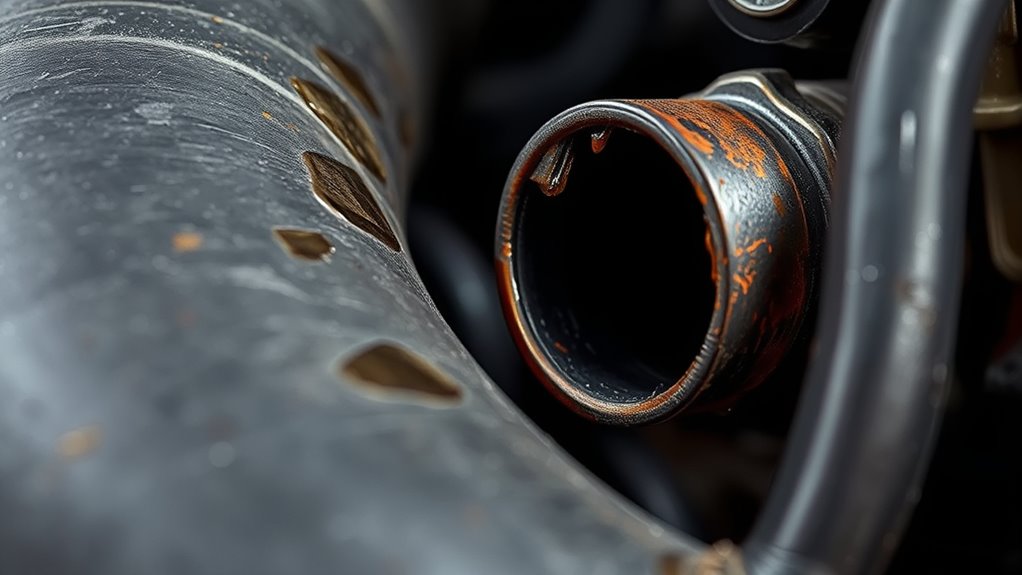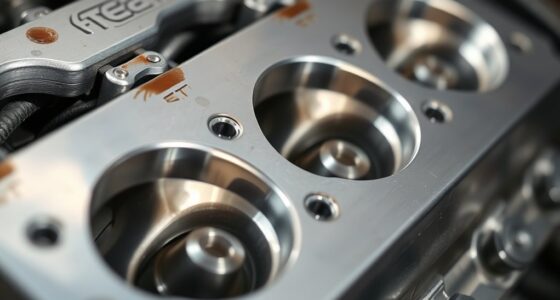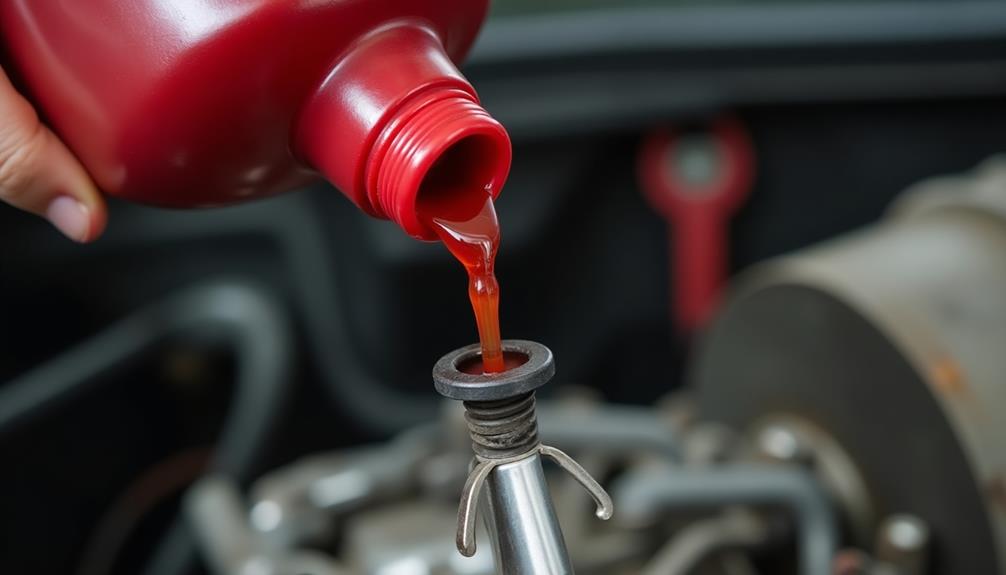If you have a vacuum leak, you might notice your engine runs rough, stalls unexpectedly, or hesitates during acceleration. You could see visible cracks, loose hoses, or hear a hissing sound near the intake manifold. Sometimes, bubbles form when spraying soapy water around suspect areas, indicating leaks. Ignoring these signs can lead to worse engine problems and increased emissions. Keep going to discover more about how to identify and fix vacuum leaks effectively.
Key Takeaways
- Engine runs rough, stalls, or idles unevenly due to unmetered air entering the system.
- Hearing hissing sounds near the intake manifold indicates possible vacuum leaks.
- Visible damage like cracked or loose vacuum hoses suggests leakage points.
- Bubbles forming when soapy water is sprayed around hoses or intake manifold signal leaks.
- Sudden drops in fuel efficiency and engine hesitation are common signs of vacuum leaks.

Have you noticed your vehicle running rough, stalling, or experiencing a sudden drop in fuel efficiency? These signs could point to a vacuum leak, which often goes unnoticed until it causes more serious problems. One of the first things you should do is a vacuum hose inspection. Over time, hoses can crack, become brittle, or disconnect, allowing unmetered air to enter the engine. Inspect all visible vacuum hoses, especially those connected to the intake manifold, and look for signs of wear, tears, or loose fittings. Sometimes, a simple hose replacement can resolve the issue, but if the hoses look fine, you might need to dig deeper.
Check vacuum hoses for cracks, tears, or loose fittings to prevent engine issues.
Intake manifold leaks are another common culprit behind vacuum leak symptoms. The intake manifold is responsible for distributing air to each cylinder, but if it develops leaks—whether from a cracked gasket, warped surface, or loose bolts—air bypasses the mass airflow sensor. This unmetered air throws off the air-fuel mixture, making the engine run lean. You might notice rough idling, misfires, or hesitation during acceleration. Additionally, a hissing sound near the engine could indicate a vacuum leak, especially around the intake manifold area. These leaks can be subtle, so paying close attention to engine sounds and performance changes is essential.
You can perform a simple test to help spot vacuum leaks. With the engine running, listen carefully for hissing sounds or use a soapy water solution sprayed around suspect areas like vacuum hoses and intake manifold gaskets. If bubbles form, it’s a sign of escaping air. For a more precise diagnosis, a smoke machine can be used to introduce smoke into the intake system; if smoke escapes, you’ve found your leak. Ignoring vacuum leaks can lead to increased emissions, poor fuel economy, and even damage to engine components over time. Additionally, some modern vehicles utilize advanced diagnostic tools that can quickly identify vacuum leaks without manual inspection.
In some cases, the leak may be small but still impactful enough to cause noticeable symptoms. Regular maintenance, including vacuum hose inspection and checking intake manifold gaskets, can prevent these issues from escalating. If you’re unsure or uncomfortable performing these inspections yourself, it’s best to have a professional mechanic evaluate your vehicle. Addressing vacuum leaks early not only restores your engine’s performance but also saves you money on potential repairs down the road. Ultimately, staying attentive to signs of vacuum leaks and promptly addressing them keeps your vehicle running smoothly and efficiently.
Frequently Asked Questions
Can a Vacuum Leak Cause Poor Fuel Economy?
Yes, a vacuum leak can cause poor fuel economy. When there’s a leak, your engine gets unmetered air, which can lead to inefficient combustion. This forces your vehicle to use more fuel to compensate. Make sure your air filter is clean, as a dirty filter can worsen fuel efficiency too. Addressing vacuum leaks promptly helps maintain ideal fuel economy and keeps your engine running smoothly.
How Do I Locate a Vacuum Leak in My Engine?
To locate a vacuum leak, start your engine and listen for hissing sounds around the vacuum hose and intake manifold. You can also spray carburetor cleaner or soapy water around these areas; if the engine RPM changes, you’ve found the leak. Visually inspect the vacuum hose for cracks or disconnections, and check the intake manifold gasket for leaks. Replacing damaged hoses or gaskets should fix the issue.
Are Vacuum Leaks Dangerous for My Vehicle’s Engine?
A stitch in time saves nine, and the same applies to vacuum leaks. Yes, vacuum leaks are dangerous for your engine because they can cause poor engine performance, rough idling, and increased emissions. Vacuum leak causes include cracked hoses or faulty gaskets, which can lead to more serious damage over time. Attending to leaks early ensures your engine runs smoothly and prevents costly repairs down the line.
Can a Vacuum Leak Affect My Car’s Emissions?
Yes, a vacuum leak can impact your car’s emissions. During vacuum leak detection, you might notice increased emissions because the leak allows unmetered air into the engine, disrupting the emissions system. This causes your vehicle to run inefficiently and may trigger a check engine light. Addressing vacuum leaks promptly helps maintain proper emissions system function, reducing environmental impact and preventing further engine problems.
How Much Does It Cost to Repair a Vacuum Leak?
The cost estimate to repair a vacuum leak typically ranges from $150 to $500, depending on the leak’s location and severity. You might consider repair options like replacing cracked hoses or sealing faulty connections. To save money, get a detailed diagnosis from a mechanic, as costs vary based on parts needed and labor. Addressing the leak promptly helps prevent further engine issues and keeps your car running smoothly.
Conclusion
Spotting vacuum leak symptoms is like finding tiny cracks in a dam—you might not see the flood coming at first, but ignoring them can lead to bigger problems down the road. Pay attention to rough idling, poor acceleration, or strange smells, and act quickly. Addressing these issues early keeps your engine running smoothly, just like fixing leaks keeps water from flooding your home. Stay vigilant, and your vehicle will thank you for it.









